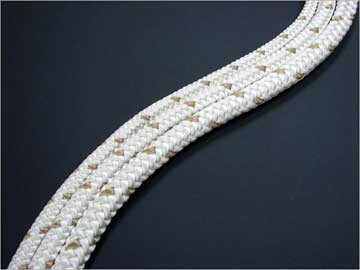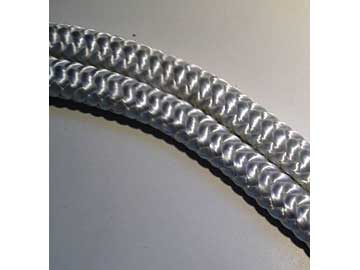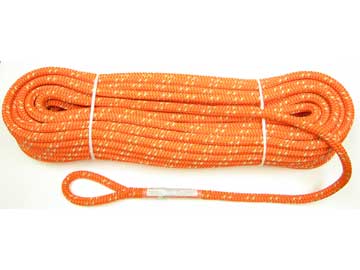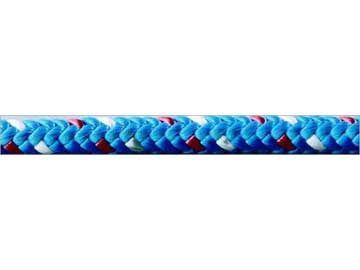ArborGold® Arborist Rope
A unique combination of polyester and polypropylene fiber results in rope with strength and superior resistnace to external and internal wear. Light weight, easy to handle, a high performance line with a high level of reliability. ArborGold® is a proven performer. Low elongation in relation to high strength and excellent abrasion resistance provide superior service life .
.
- Dependable 12-strand construction
- Tree rope
- White with gold tracer
- Light weight, easy to handle
- 6.7 lbs per 100 ft
- 5,000 lbs tensile
- Abrasion resistant
- Lower stretch than solid braid rope
- Durable construction
- Long service life
- Quality polypropylene monofilament jacketed with premium polyester
- Made in the USA
ARBORGOLD® SPECIFICATIONS
3216615
1/2" x 600' Reel
$396.60
Average break strength 5,500 lbs
3216611
1/2" x 200' Hank
$141.60
Average break strength 5,500 lbs
3216614
1/2" x 150' Hank
$105.60
Average break strength 5,500 lbs
3216613
1/2" x 120' Hank
$84.60
Average break strength 5,500 lbs
3216617
5/8" x 600' Reel
$595.60
Average break strength 9,000 lbs
3216619
5/8" x 200' Hank
$207.60
Average break strength 9,000 lbs
3216628
5/8" x 150' Hank
$155.60
Average break strength 9,000 lbs
3216618
5/8" x 120' Hank
$124.60
Average break strength 9,000 lbs
ArborPro® Arborist Rope
 With a protective over finish which enhances working performance and resistance to abrasion, 12 strands of high tenacity polyester with identifying blue center marker yarn construct this superior climbing rope. ArborPro® performing at a high level of durability, strength, and exceptional knot control will reliably maintain its shape and stability in use.
With a protective over finish which enhances working performance and resistance to abrasion, 12 strands of high tenacity polyester with identifying blue center marker yarn construct this superior climbing rope. ArborPro® performing at a high level of durability, strength, and exceptional knot control will reliably maintain its shape and stability in use.
- Dependable 12-strand construction
- Climbing rope
- Light weight, easy to handle
- Long service life
ARBORPRO® SPECIFICATIONS
322L145
1/2" x 600' Reel
$502.60
Average break strength 7,500 lbs
322L146
1/2" x 200' Hank
$176.60
Average break strength 7,500 lbs
322L085
1/2" x 150' Hank
$132.60
Average break strength 7,500 lbs
322L067
1/2" x 120' Hank
$105.60
Average break strength 7,500 lbs
Fastline® Arborist Rope
 Fastline® 16-Strand braided construction with a polyester jacket over a nylon core is preferred among arborists. When you experience its superior working performance and handling ease Fastline® 16-Strand will quickly become your favorite. Fastline® 16-Strand with a good working grip from the full diameter will maintain excellent in service flexibility.
Fastline® 16-Strand braided construction with a polyester jacket over a nylon core is preferred among arborists. When you experience its superior working performance and handling ease Fastline® 16-Strand will quickly become your favorite. Fastline® 16-Strand with a good working grip from the full diameter will maintain excellent in service flexibility.
- Dependable 16-strand construction
- High visibility
- High performance
- Spliceable
- Low stretch for controlled elongation
FASTLINE® SPECIFICATIONS
330FL600
1/2" (12.5 mm) x 600' Reel
$667.60
Average break strength 6,500 lbs
330FL200
1/2" (12.5 mm) x 200' Hank
$226.60
Average break strength 6,500 lbs
330FL150
1/2" (12.5 mm) x 150' Hank
$170.60
Average break strength 6,500 lbs
330FL120
1/2" (12.5 mm) x 120' Hank
$136.60
Average break strength 6,500 lbs
All American® Arborist Rope
 A unique combination of polyester and polypropylene fiber combining all the abrasion resistance of polyester over a strong monofilament polypropylene core. A line with strength and superior resistance to external and internal wear. Light weight, easy to handle and high performance. ALL AMERICAN® great visibility, low elongation, high strength and excellent abrasion resistance provide exceptional service.
A unique combination of polyester and polypropylene fiber combining all the abrasion resistance of polyester over a strong monofilament polypropylene core. A line with strength and superior resistance to external and internal wear. Light weight, easy to handle and high performance. ALL AMERICAN® great visibility, low elongation, high strength and excellent abrasion resistance provide exceptional service.
- Dependable 12-strand construction
- Sharp visibility
- High performance
- Non-hockling
- Non-rotational
- Long service life
- Quality polypropylene monofilament jacketed with premium polyester
ALL AMERICAN® SPECIFICATIONS
325L245
3/4" x 120' Hank
$174.60
Average break strength 12,000 lbs
CAUTION: USE OF WORKING LOADS
Because of the wide range of rope use, rope condition, exposure to the several factors affecting rope behavior, and the degree of risk to life and property involved, it is impossible to make blanket recommendations as to working loads. However, to provide guidelines, working loads are tabulated for rope in good condition with appropriate splices, in non-critical applications and under normal service conditions.
The Cordage Institute Formula for working load is:
Working Load = Minimum Breaking Strength/Safety Factor
A higher working load may be selected only with expert knowledge of conditions and professional estimate of risk. Also, if the rope has not been subject to dynamic loading or other excessive use, has been inspected and found to be in good condition, is to be used in the recommended manner; if the application does not involve elevated temperatures, extended periods under load, or obvious dynamic loading (see explanation below) such as sudden drops, snubs or pickups. For all such applications and for applications involving more severe exposure conditions, or for recommendations on special applications, call Jay at 763-263-9835.
**Many uses of rope involve serious risk of injury to personnel or damage to valuable property. This danger is often obvious, as when a heavy load is supported above one or more workmen. An equally dangerous situation occurs if personnel are in line with a rope under tension. Should the rope fail, it may recoil with considerable force. Persons should be warned against the serious danger of standing in line with any rope under tension. IN ALL CASES WHERE SUCH RISKS ARE PRESENT, THERE IS ANY QUESTION ABOUT THE LOADS INVOLVED OR QUESTIONS ABOUT THE CONDITIONS OF USE, THE WORKING LOAD SHOULD BE SUBSTANTIALLY REDUCED AND THE ROPE PROPERLY INSPECTED.
DYNAMIC LOADING VOIDS NORMAL WORKING LOADS
Normal working loads are not applicable when the rope is subject to significant dynamic loading. Whenever a load is picked up, stopped, moved or swung there is an increased force due to dynamic loading. The more rapidly or suddenly such actions occur, the greater the increase will be. In extreme cases, the force put on the rope may be two, three or even more times the normal involved. Examples could be picking up a tow on a slack line or using a rope to stop a falling object. Therefore, in all such applications such as towing lines, lifelines, safety lines, climbing ropes, etc. working loads as given DO NOT APPLY.
Users should be aware that dynamic effects are greater on a low elongation rope such as polyester than on a high elongation rope such as nylon, and greater on a shorter rope than on a longer one. The working load ratios listed contain provision for very modest dynamic loads. This means, however, that when this working load has been used to select a rope, the load must be handled slowly and smoothly to minimize dynamic effects and avoid exceeding the provision for them.
EFFECT OF TEMPERATURE ON TENSILE STRENGTH
The tensile strength charts apply to ropes tested at normal room temperature (70°F). Ropes have lower tensile strengths at higher temperatures. 30°F (or more) lower at the boiling point of water (212°F) and continuing on down to zero strengths for nylon and polyester at 490°F and 300°F for polypropylene.
Also, continued exposure at elevated temperatures causes permanent damage. TENSILE STRENGTHS shown are average based on new ropes tested under laboratory conditions, minimum can vary by 10%.
 .
. With a protective over finish which enhances working performance and resistance to abrasion, 12 strands of high tenacity polyester with identifying blue center marker yarn construct this superior climbing rope. ArborPro® performing at a high level of durability, strength, and exceptional knot control will reliably maintain its shape and stability in use.
With a protective over finish which enhances working performance and resistance to abrasion, 12 strands of high tenacity polyester with identifying blue center marker yarn construct this superior climbing rope. ArborPro® performing at a high level of durability, strength, and exceptional knot control will reliably maintain its shape and stability in use. Fastline® 16-Strand braided construction with a polyester jacket over a nylon core is preferred among arborists. When you experience its superior working performance and handling ease Fastline® 16-Strand will quickly become your favorite. Fastline® 16-Strand with a good working grip from the full diameter will maintain excellent in service flexibility.
Fastline® 16-Strand braided construction with a polyester jacket over a nylon core is preferred among arborists. When you experience its superior working performance and handling ease Fastline® 16-Strand will quickly become your favorite. Fastline® 16-Strand with a good working grip from the full diameter will maintain excellent in service flexibility. A unique combination of polyester and polypropylene fiber combining all the abrasion resistance of polyester over a strong monofilament polypropylene core. A line with strength and superior resistance to external and internal wear. Light weight, easy to handle and high performance. ALL AMERICAN® great visibility, low elongation, high strength and excellent abrasion resistance provide exceptional service.
A unique combination of polyester and polypropylene fiber combining all the abrasion resistance of polyester over a strong monofilament polypropylene core. A line with strength and superior resistance to external and internal wear. Light weight, easy to handle and high performance. ALL AMERICAN® great visibility, low elongation, high strength and excellent abrasion resistance provide exceptional service.